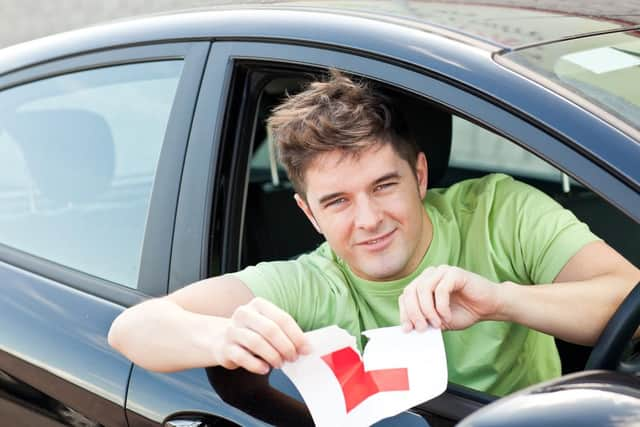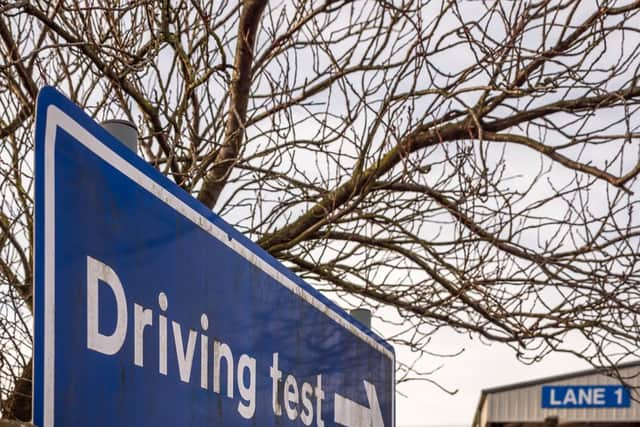How to beat driving test nerves: advice from the experts
and live on Freeview channel 276
Learner drivers haven’t had an easy time of it recently.
The last year has seen hundreds of thousands of driving tests cancelled or rescheduled and, even as lockdown has eased, learners have struggled to secure a test date.
There are still huge queues to secure an appointment and the fear of failing and having to wait months for another try is adding to an already stressful situation for many.


Advertisement
Hide AdAdvertisement
Hide AdSo, to help learners overcome driving test nerves we’ve spoken to Dave Dunsford, a senior driving instructor at RED Driving School to see what learners can do to manage their anxiety and pass their test.
Dave says: “I’ve seen first-hand how anxiousness can hinder a learner driver’s progress and how some very good candidates fail their driving test because of stress and nervousness on their big day.
“Most people assume driving anxiety stems from fear of crashing your car or having an accident. This is not the case. According to Dr Paul Greene, the most common cause of driving anxiety is the fear of having a panic attack. Sometimes, people have a panic attack when driving and then have a significant fear of that happening again. Other key causes of driving anxiety include previous traumatic experiences when in a car, claustrophobia, a lack of confidence, getting lost or unpredictable road conditions.
How to spot and cope with driving anxiety


Similar to symptoms of general anxiety, symptoms of driving anxiety can include shortness of breath, dizziness, a racing heartbeat, sweaty palms and disorientation, amongst others.
Advertisement
Hide AdAdvertisement
Hide AdUnsurprisingly, driving anxiety can often be reduced or overcome by increasing driving experience. For learner drivers, this is not so easy.
Says Dave: “All too often I see nerves get the better of students during their driving tests. As a result we recently launched a How To Beat Driving Test Day Nerves webinar series to support learner drivers manage and minimise anxieties around their driving test.
On top of this, yoga and meditation can both be helpful in reducing and keeping stress at bay.
Before your test, take time to prepare, make sure you revise the show me, tell me questions and try to have driven the test routes in advance.
Advertisement
Hide AdAdvertisement
Hide AdOn the day, give yourself plenty of time to get to the test centre and if you get there early try to find a distraction so you’re not focusing on your nerves.
Another anxiety busting tip that can be performed whilst driving is to focus on your breathing. This can be done by breathing deeply in for five seconds, and out again for five seconds, repeating for up to three minutes or until the sensation subsides.
If you’re already a nervous driving, another popular technique to overcome anxiety include desensitisation ahead of your test date. This involves taking small steps to put yourself in situations that trigger anxiety in order to become familiar with the situation and to desensitise yourself to the triggers. In the case of driving, this could mean simply sitting in a parked car with the engine running.
Dietary tips that can help before a driving test
Whilst seemingly obvious to many, it is important to avoid caffeine and empty stomachs before a test. Hunger and dehydration can cause both lead to a loss in concentration, so eat a light, healthy meal before your test and make sure to drink plenty of water.
Advertisement
Hide AdAdvertisement
Hide AdAnother nutritional tip is cutting down on your caffeine intake or removing it entirely can have a surprisingly positive effect on anxiety. If you want to combat your anxiety, it can be vital to ensure you’ve eaten something before driving and to make sure you don’t drive if you’re sleep deprived.
Believe in yourself
The most important thing is not to doubt yourself. If your instructor puts you down for a test then they think you are good enough. It is easier said than done but try to avoid putting pressure on yourself.
If your apprehensions and anxieties don’t improve straight away, it’s okay – it doesn’t need to be an overnight change of mindset.
Comment Guidelines
National World encourages reader discussion on our stories. User feedback, insights and back-and-forth exchanges add a rich layer of context to reporting. Please review our Community Guidelines before commenting.